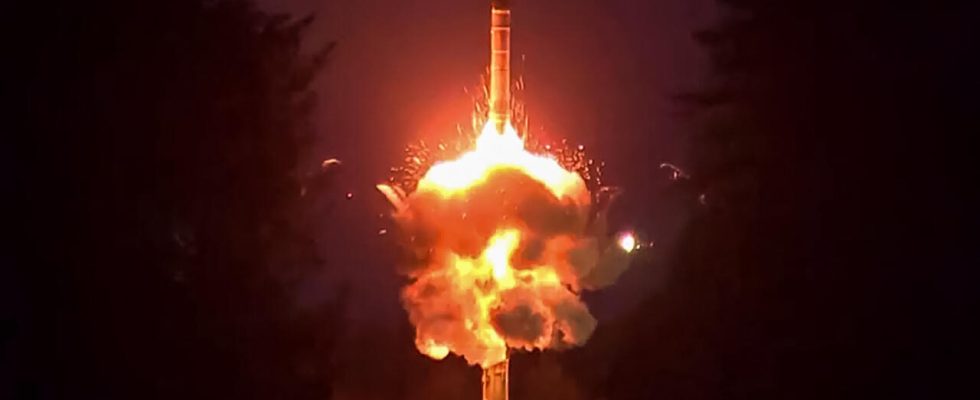Russia carried out test firings of ballistic missiles on Wednesday to simulate a “massive nuclear strike” in response and revoked its ratification of a treaty banning atomic tests. Events which do not constitute an immediate threat, but further support the decline in global nuclear weapons control policy, according to researcher Héloïse Fayet. Interview.
Vladimir Putin is once again threatening the red button. On Wednesday October 25, the Russian President supervised the firing of ballistic missiles during military maneuvers aimed at simulating a “massive nuclear strike”, in response “to an enemy nuclear strike”, in the words of Defense Minister Sergei Shoigu .
The same day, the upper house of the Russian Parliament approved the revocation of the ratification of a major treaty banning atomic tests.
This vote comes in a context of growing tensions between Moscow and Washington, engaged in an arms race while the war in Ukraine continues.
In February 2023, Russia had already decided to suspend its participation in the New START agreement, the last bilateral treaty linking the two countries on nuclear arms control, which provides for the capping of strategic warheads and bombs deployed at 1,550.
Deputy Foreign Minister Sergei Ryabkov indicated that the resumption of discussions with the Americans on the renewal of this treaty, which expires in 2026, was simply excluded “without a change in the deeply and fundamentally hostile attitude of the States -United towards Russia.
To analyze the risks of these blockages between the two powers, which between them hold nearly 90% of all existing nuclear weapons in the world, France 24 spoke with Héloïse Fayet, researcher at the Center for Security Studies of the Ifri (French Institute of International Relations) and coordinator of the Deterrence and Proliferation program.
France 24: This is not the first time that Vladimir Putin has mentioned the use of nuclear weapons in the context of the war in Ukraine. Should this threat be taken seriously? ?
Héloïse Fayet : For Russia, evoking the nuclear threat is a way of recalling the deterrent capabilities from which it benefits when it finds itself in difficulty on the ground.
The maneuvers carried out by the army on Wednesday are not the first of this type. It is an annual exercise and Moscow has taken care to specify that it is to simulate a response fire in the event of an “enemy nuclear strike”.
In my opinion, there is no sign that the Russian president could unleash nuclear weapons. Russia considers the conflict in Ukraine as a local conflict, but nuclear deterrence makes it possible to avoid the widening of this type of conflict. Using it would be completely counterproductive.
Can you explain to us the implications of the Nuclear Test Ban Treaty and why Russia revoked its ratification? ?
This treaty prohibits all nuclear tests, including underground tests, the only ones still possible from the point of view of international law since the 1963 agreement which prohibited nuclear tests in the atmosphere, in space and under the ‘water.
However, it should be noted that this complete ban treaty has not yet entered into force because it must first be ratified by certain countries such as the United States and China. Russia had already threatened to withdraw to put itself on par with the American position. It is now done, even if this “deratification” is rather symbolic.
In the current context of increased tensions with Washington, Russia wants to be ready, in the event that the United States conducts tests, even if in reality neither side wants it.
For Russia, it is more of an announcement effect aimed at criticizing standards considered to be imposed by the West. Because the taboo on nuclear tests is still very important, no one wants to be associated with them, apart from North Korea which is the last country to have conducted them.
Concerning the New START agreement, on nuclear arms control, are negotiations still possible or is the agreement destined to expire in 2026 ?
Russia has already suspended its participation, so New START can be considered buried. This type of treaty is negotiated years in advance and at present there are no discussions. The issue of arms control is parasitized by rivalries between powers, whereas it should be protected from them.
It suffers from tensions between Moscow and Washington but also between Washington and Beijing. China does not want to enter into this type of agreement with the United States at a time when it is very rapidly increasing its nuclear arsenal. But it still remains behind Washington and Moscow. This increase is essential from Beijing’s point of view to assert its status as the world’s leading power. Conversely, the Americans, who wish to limit Chinese power, are obviously in favor of it.
Meanwhile, international arms control standards are falling. The entire disarmament architecture, built during the Cold War, is being unraveled.
Read alsoNuclear bomb over Siberia: when Russian propaganda goes wrong
Sincees attacks of Hamas in Israel, a new war broke out. The Jewish state is the only regional power to possess nuclear weapons. Could he consider using it in the event of a fire? ?
First of all, it should be remembered that the Israeli nuclear doctrine is very particular because the Jewish state neither denies nor confirms possessing this weapon, although we know that they have it.
Then, possessing nuclear weapons serves above all to deter another state from using its own. Its role is therefore very out of sync with the conflict situation vis-à-vis Hamas, which is not a state and of course does not possess this weapon. Furthermore, employment in a territory as small as the Gaza Strip is completely unthinkable because it is far too dangerous for Israel. Its use seems highly improbable in the context of this conflict, even if it were to expand.

